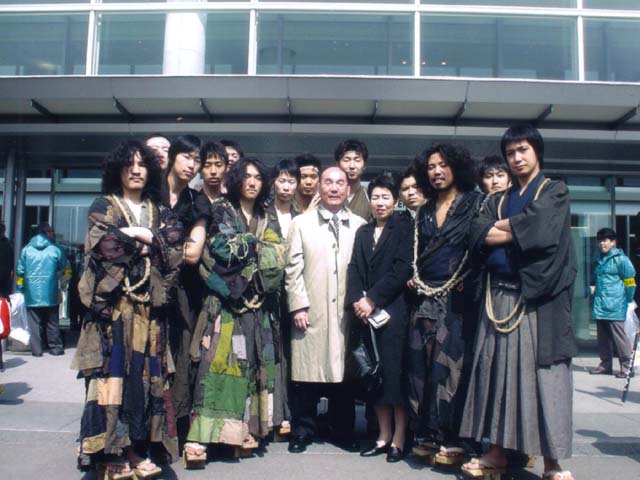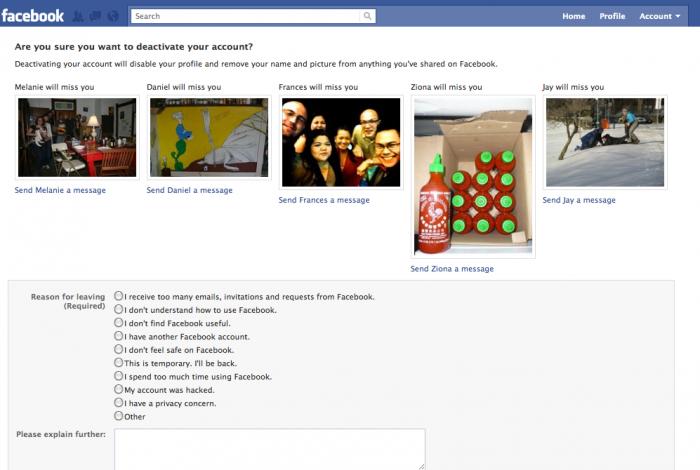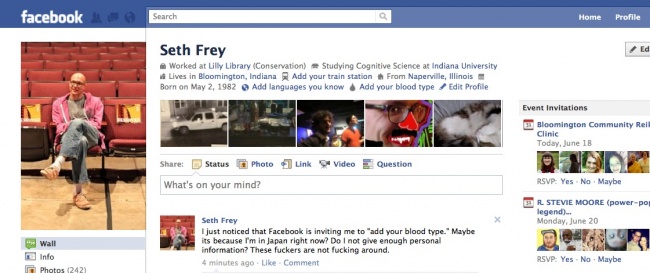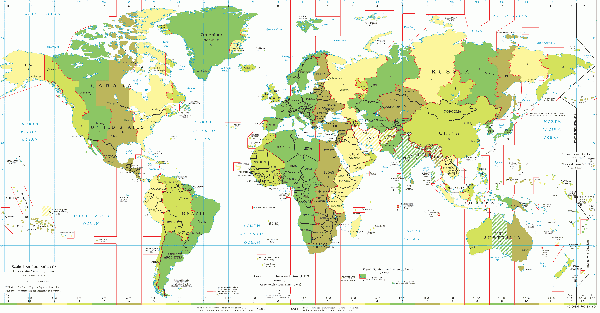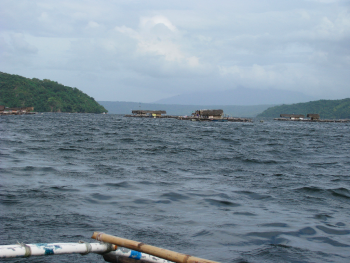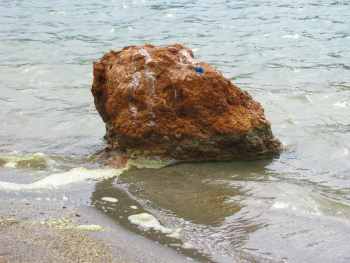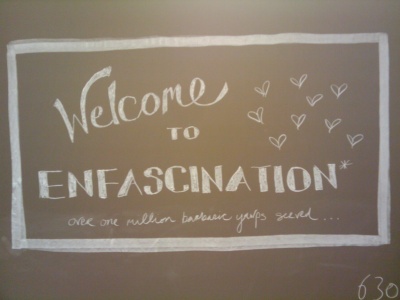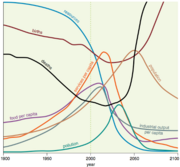Sharing
From enfascination
- web log, with topics including but not limited to thoughts and teapots.
HEY, enfascination has moved! But there's lots of pretty old stuff here.
Most popular:
- Make natural quills and ink very easily
- Minimally Burning Laser with Easy Power Supply
- My TEDx talk
- Facebook mind
- Enfascination lecture series 2011
- Enfascination lecture series 2010
Source on Kahneman's "magical" behavior VNC and grey screen terminal | |
The blog has moved off of mediawiki. To keep getting updates, you can subscribe to http://enfascination.com/weblog/?feed=rss2 | |
I guess this is bragging, maybe just documenting. A few years ago, I added a self-referential illustration to Wikipedia's article on the concept "meta." I checked up on it about two years ago and found it got removed. Who would do that? I just dug up the edit that did me in. At least the editor's (understandable) squareness came with a little acknowledgement. | |
Simple distributed strategies that modify the behaviour of selfish individuals in a manner that enhances cooperation or global efficiency have proved difficult to identify. Impossible sentences that confound their readers attempt to read them in a way that communicates any meaning at all to people with limited memory spans have proved difficult to tolerate. The excerpt is from Davies, A., Watson, R., Mills, R., & Buckley, C. (2011). “If You Can‘t Be With the One You Love, Love the One You’re With”: How Individual Habituation of Agent Interactions Improves Global Utility. Artificial Life. Otherwise a fine paper. | |
by contrast, epitome just scratches the surface | |
So there is a whole empirical method for establishing the relative historicity of different New Testament Bible verses. Its adherents assume that the Bible was written, that its old, that there may have been a Jesus, and lots of disciples, and that a lot has happened between then and now. It doesn't disqualify the supernatural a priori, attending instead to ways that the supernatural disqualifies itself. I found some of the criteria scholars use to establish the "historicity" of different passages. These criteria build upon archaeology when they can, but mostly upon established techniques in textual analysis, like those for arguing that two books were or weren't written by the same writer.
These aren't the most solid criteria for establishing The Facts, but with a fundamentally shaky foundation, I won't mock any house that manages to stand. It shows discipline and an elementary skepticism. I'm tempted to add one criterion, an inverse of Sitz im Leben. It relates to this problem of historical context. Jesus appeared in a time and place that was waiting for The End, and for a Messiah to take everyone there. Prospective messiahs of the time---and there was always a new Messiah popping up---all tried to fit themselves into the commonly acknowledged Messiah archetype, including divine birth, miraculous healing, knowledge of scripture, apocalyptic message, and resurrection (appearance to believers after death).[1][2] Matthew, and parts of the other biographies, read like a list of easter eggs. When Jesus isn't explicitly invoking Biblical prophecy (like sending disciples to nab him a donkey and make his ride into Jerusalem prophetic), his biographers may have tweaked words to make his actions into those of the textbook Messiah. With the remarkable power we have to manifest our desires---above and below the surface of conscious awareness---its hard to separate the truth from the fabrication (and I expect big helpings of both, well- or ill- intentioned). Given these veins of an apocalyptic social context, I'm tempted to give more legitimacy to words and actions that were unanticipated. I'll have to refine this criterion for myself, because it doesn't lead me to doubt Jesus's donkey ride (more than anything else). Maybe that is because the donkey ride gets some legitimacy from the criterion of embarrassment, since Jesus had to get it by worldy means (it didn't fall out of the sky). Also, none of these criteria allude to the fish story effect, in which the longer (and younger) Gospels flesh out known stories and make them more miraculous. I'm thinking of how Jesus recruited Simon and Andrew, sometimes (in Matthew and Mark) merely by telling them to stop fishing for fish, but elsewhere (in Luke) by performing some miracles and then telling them to stop fishing for fish. Regardless, the New Testament is an interesting read, slow read, pretty transparent in places, but generally enlightening. I decided to read it before the Old One, partly because I've already tried and failed at the old one so many times in the past. I've got a long way to go. | |
Microsoft places the "Betty Crocker Search Provider," and about ten others, above Google in its list of alternatives to Bing | |
I was involved in a project with a collective called Grassroots Economic Organizing. They are a bunch of pretty radical activists and organizers interested in small-scale economies. And they are interested in science. I've been working over the past six months with Michael Johnson to bring you a special issue of their online journal that integrates the work of practitioners with the work of many people from Elinor Ostrom's Workshop in Political Theory and Policy Analysis. We also got invited David Sloan Wilson to write a book review on Martin Nowak's Supercooperators. Here:
On n'est pas capable d'aider, mais considérer si tout le battage publicitaire de la baie acai est précis également à distance quand il apparaît aux avantages de santé remarquables de baie acai. Je veux dire vraiment maintenant, pouvez une très petite baie traitée de la bonne façon soutient en fait nos corps cela de façon significative ? Enfin, ayez-vous a remarqué la liste que cette très petite pierre précieuse tout-naturelle est destinée pour juste s'en occuper est énorme. Je pense qu'il y a constamment un battage publicitaire introduit dans n'importe quelles marchandises ou il ne le vendrait pas comme les désirs du producteur à. Cependant, il regarde que certains individus pourraient être partis cartes sur table quand cela arrive aux récompenses de santé de baie acai. Cependant, étant donné que la liste est si énorme j'ai décidé si elle a fait seulement 1 quart de ce qu'ils déclarent cialis qu'elle fait ce serait un très bon facteur pour moi. Surtout la considération que j'étais obèse, avait du grand cholestérol et pourrait utiliser le fait d'améliorer de pouvoir. Donc j'ai pris une décision pour commencer à utiliser la baie acai. C'était au-dessus d'une année dans le passé et je le prends juste même maintenant immédiatement. J'ai découvert rapidement que même même s'il y avait un battage publicitaire là-bas cette baie mineure excellente fait en fait sont fidèles à son nom. J'ai égaré le poids d'excès et l'ai conservé de. Mon cholestérol est descendu comme a mon triglycerides. J'ai vraiment beaucoup plus d'énergie que j'attribue aux deux la baie acai et le fait simple que j'ai égaré bodyweight et expérience 100 % beaucoup mieux et plus en bonne santé. J'y ai mon mari comme correctement et les récompenses qu'il a obtenues ont correspondu à mien et j'ai pensé que cela ne pouvait pas blesser que les Indiens d'Amazone se mettent en contact avec cela Cialis naturel. On m'a offert sur la santé stupéfiante des aspects positifs de baie acai. Cela a été une bénédiction pour nous et nous continuerons à juste le prendre puisque nous nous développons plus vieux. Mon seul regret est que je ne l'avais pas quinze beaucoup d'années en arrière. =!= | |
A libertarian is someone, usually a Westerner or some other kind of American, who uses freedom as the criterion for evaluating social policy and/or believes that free markets should be used for distributing all resources. If we are having a conversation and you drop your libertarian leanings, I'm going to quietly start trying to fit you (get you to fit yourself) into one of three boxes. They work great---better than I've expected---and I haven't yet found a need for the fourth box called "This guy is a smart, sharp, actual libertarian." When you come out with the word, I'm going to spend the next few minutes trying to figure out whether you
I've lowered my standards enough that I'll pass most libertarians if they make it into the third box instead of the first two. All the really smart, sharp libertarians have made way too many compromises, and practice a unique, reasonable, ideosyncratic belief system that they continue to mislabel, usually for sentimental reasons or because they are antiwar. I'd love to know that the fourth exists beyond the brave embattled image that the first three sometimes hold for themselves. I'll let you know what I find. I'm still learning, of course---I discerned a new subdivision only last night. Among the people who aren't really libertarian you've got
But if you've disqualified yourself from libertarianism and you keep using the term, you're doing something wrong. I'm not sure if its a sentimental attachment to the term, the joy of identifying with something simple, maybe the joy of trying to make a complex world fit into it. But what it reduces to is saying things you don't mean. If you think that government should be thinner, or if you don't like the way that social norms are enforced in large-scale social systems, or you value freedom better than other valenced abstractions, just say one of those things. By naming these little things by the grand term libertarian, you imply that they imply each other, and you take on a whole other bunch of commitments that you can't defend. | |
There was a time when economists were horrified by the idea of marketing and advertising. Its understandable---marketing undermines the assumptions of the market institution. It leverages the patterns of psychology and sociology to bend the laws of economics. For example, the math behind microeconomics assumes that preferences, commodityhood, objecthood, even agenthood are fixed, but with coupons, branding, bundling, defaults, advertising, advertising to children, and countless other techniques, marketing makes all of these the playthings of the seller. With sellers creating demand among buyers, and leveraging any predictability in the human psyche, I completely understand why marketing made economists nervous. What I don't understand is what happened next, or didn't. There must have been some invisible synthesis of business practice with economic theory, because I don't hear economists being nervous about advertising. I didn't even realize that advertising presented theoretical problems until I read, in an old economics paper, a reference to an even older economics paper expressing dismay at the ubiquity of marketing in business. Maybe the old tinny ivory opinions got passed over when economics was digested for the business school? I'll guess that the conventional wisdom fits advertising into The Grand Scheme of Things, naively or quietly accepting that want is an independent measure of value. Whatever role straight mathematical microeconomic theory plays in the functioning of today's market-mediated society, it is much smaller or much different than we imagine. | |
Dating would be different if all dates were first dates. This doesn't just apply to dating, but really to anything that has a chance, however small, of continuing to give a payoff for a long time. We tend to be risk-averse, and we should tend to be risk-seeking. I'm not talking about walking-down-dark-alleys-to-see-what-will-happen risks. I'm mostly thinking about benign ones that we wouldn't even recognize as risky: trying to drive a different route to your friend's house, or a new recipe, or being social at parties. The worst that will happen is that you are back where you started. If all dates, no matter how good, were the first and the last---if a positive lasting connection with somebody was not among the possible outcomes of a night out---then the best way to date would be to imagine one thousand blind dates, good and bad, with a thousand people. If the average enjoyment is less than the average joy of staying at home, you should stay home. In the psychology and economics of decision making, you are reasoning about expected utility in the context of uncertainty, and you get into risk. Some people expect the average turnout to be positive, but they stay home on the chance that a given date will go bad anyway. These people are risk averse. Some do the opposite, and gamble on the slim chance that its worth it. These people are called risk seeking. And the people who play it like they see it are called risk neutral. This is dating in a world where you'll never get a second date. How do things change if it is possible to continue seeing somebody that you like? You no longer care about the average joy from a thousand dates. The numbers change when you are playing for keeps. To simplify the game, say that you get to try out the thousand prospectives, and pick who you liked the best. In this case we aren't comparing a night alone with the average date, but with the yet-unknown best date in the batch. You are playing for the max instead of the mean. In this context, behavior that looked risk-seeking before is the most rational (and also the most likely to make you happiest in the long run). Scott Page gives this toy example from his book Diversity and Complexity. Imagine that you get to pull blindfolded from two big bowls: one has black and white marbles worth 8 and 9 dollars respectively, and the other urn has ten different colors of marble worth 2,3,4,5,6,7,8,9, and 10 dollars. You can think of these as two dating pools: one has high average quality (the friends of that one classy friend), and the second is a terrifying leery dive that somehow attracts this impossible invisible minority of perfect gems (the nines and tens). You draw a dozen marbles and get paid at the end based on what is in your hand. If the amount of money you get is the average of the marbles in your hand, you should always draw from the first bowl, because you'll tend to get $8.50 (instead of just $6.00). But if I offer to pay you based on the highest value marble in your hand, you should draw from the higher-risk bowl. For more than seven draws (if you pull more than seven dates from the dive) you are likely to draw a $10.00 marble at least once. If you live in a world of second dates, you should date a lot and you should take your chances with the dive. The same goes with any other gamble that rewards the max instead of the mean. Try cooking: You will eat better if you forego the same safe recipes and just start cooking wild crazy inventions. This is because in cooking we can learn and/or write things down. Junkyards, thriftstores, research and development, learning to walk, team sports, anything that hasn't been solved yet. You only need one out of a hundred crackpot ideas to pan out. This is a strong case for taking more risks in your everyday life. And yet, decades of research, across hundreds of domains, have shown that people tend to be risk averse---or exactly wrong. But behavior that looks reckless can be rational, and trying new things can be the way to lasting happiness. | |
Impress your crafty kombucha swilling friends with these handy factoids and make yourself intolerable!
Japanese people are really surprised by the idea of Americans drinking rotten tea, calling it Japanese, and giving it a name that doesn't fit. I was really surprised about all this because I love kombucha and was really eager to drink some in Japan. That isn't going to happen. Here are some less snotty factoids on the subject---constructive rather than destructive:
| |
Buddhism is one of many incredibly old religions loaded with more historical cruft than is necessary to be a religion. Vipassana is a small, minimal, and very old tradition out of Buddhism that has been passed on for thousands of years in monasteries in Burma. It isn't cruft-free, but close, like how non-alcoholic beer can have half-a-percent of alcohol For the purposes of this article, a scientist is anyone who has quietly or loudly bought into the sentiment that being good at thinking implies being bad at feeling. The scientist has not accepted this because its true or attractive, but because something better was never available. One potential Something Better is that the two are nearly indistinguishable, and that sensitivity to subtle sensations is necessary for clear thinking. Vipassana can be seen as offering religious or spiritual practice, but its entirely focused on the regular practice of meditation, where meditation is sitting quietly and watching yourself feel. Meditation is a fantastic thing to be able to know and do. This is true for scientists. For all its differences from the things you might be familiar with, the 10-day Vipassana courses available through http://www.dhamma.org are the best way to learn how to meditate. With its Eastern roots and low profile, Vipassana is easy to chunk as a fringe religion making its buck. It is growing, due in part to the efforts of one practitioner, S. N. Goenka, who appears on tape in meditation retreats around the world. His low-tech website doesn't have any of the gradients or Javascript that we've confounded with trustworthiness. His centers are growing quickly in India, and they have strong representation in North America. I think this success in the States is aided by the fact that we like our Eastern religions monastic. Any decent scientist will have a completely understandable skepticism of this Goenka and his company. For starters, what does he charge? After the ten days are over, on your way out, the teachers announce that you are paid for already and that you can give them money if you would like someone else to experience what you just went through. Your ten days included room and delicious board. Even with this entirely voluntary income stream, based on a very soft sell, the centers continue to run and to grow. The 10 days act as training, a crash course in meditation. The goal is to get you to a point where you can benefit from sitting regularly on your own as soon as you get back home. Without an intensive introduction, many people can sit regularly for months before feeling anything, and that makes meditation a difficult habit to pick up. So you sit, and you pay attention to yourself not wanting to sit anymore, and you do that for about 100 hours, and you learn about yourself. You suffer, it rarely has fleeting moments of greatness that probably don't make up for the many hours of misery, but we are too limited to balance these ups and downs rationally, and after its all over you've maybe gained a tiny tiny glimpse into why. Its science at its best. A regular practice after the retreat, if you end up making time for it in your life (as little as an hour a week) can make you think better and more clearly. And all of this is even more true if you are in the brain sciences. You will never have a better opportunity to see yourself be a thing that thinks in a body in time, and to see it happening as its happening. When I went in 2003 I had just taken my first courses in cognitive psychology and psychophysics. I actually experienced many of the processes I read about, and I came home with ideas for experiments, despite my best efforts to stay focused on meditation. Practicing Vipassana also makes you identify with compassion, equanimity, and it helps you understand suffering. Its volunteers devote themselves to spreading Vipassana because of these effects of meditation. But if you are only interested in meditation to help you think better, you can go into it treating compassion et c. as probably-unobjectionable side effects until you've given yourself time to evaluate them for yourself. The minimalism is what attracts me to Vipassana over other styles of meditation. As a way to sit, it avoids tricks like counting and visualization. And as a social entity, it is also very stripped down. One claim you hear repeated in the retreat is that "Buddhism is sitting." No holidays, cosmogonies, costumes, or God. It isn't totally clean of history: The teachers wear robes instead of pants, they play tapes of Goenka chanting, and you chant too. They ask you to refrain from eating meat, eating after noon, masturbating, killing things, and to subscribe to other constraints that they see as aiding your practice. Towards the middle of the ten days you will hear mention of reincarnation on one of Goenka's pre-recordings. You will even hear an implication that its an ideological prerequisite. That was as close as it got to relying on superstition. You might be less likely than me to let it slide. If so, Paul R. Fleischman, who has been active in the American Vipassana community for decades, writes with his son in the title essay of Karma and Chaos to suggest that Vipassana's reincarnation is just something that is useful to believe to aid your practice. The Fleischmans invite the scientifically-minded to replace reincarnation---if they'd like---with the connectedness implicit in chaos theory. But once you've recognized reincarnation as a pragmatic concession, you are free to any of a variety of more palatable beliefs to fill its role. You will hear Goenka himself make some well-intentioned attempts to explain meditative states in the vocabulary of the scientific worldview. Regardless, Vipassana is not pitched to scientists who want to think more clearly. Its aim "is total eradication of mental impurities and the resultant highest happiness of full liberation." If you sign up, you'll have to remember that you are a guest and that different people are there with different backgrounds and for different reasons. You'll have to assume good faith and be tolerant of things that are unfamiliar. In the end, I think its impressive how hands-off Vipassana is for something that people treat as spiritual practice. Let me compare it to other traditions out of Buddhism. The Western conception of Zen is as something clean and minimal, but I've been to Zen monasteries and I've experimented with their techniques. Zen, even when it is heavily simplified for Westerners, is almost as full of inscrutable historical accident as Tibetan Buddhism, home of the Dalai Lama, whose religious canon is 3,000 times longer than the Christian Bible. By comparison, Vipassana is teaching only techniques for sitting and paying attention to sensations in your body. So I'm calling Vipassana a part of scientific practice, even if at first it looks more like religious practice. If you want a lasting introduction to meditation for the least time, money, and religious instruction, a Vipassana course is your best bet. If you want to try out a ten-day, you'll want to sign up two months or more in advance, especially if you can only free up ten days during the summer or winter break (and if you're signing up as female). You should read what the insiders have to say about it, and then you can dig after their retreats and webforms. Here is the site: http://www.dhamma.org/ UpdateEric, who is at a conference in India before trying his first retreat, let me know that I'm not the only one pitching Vipassana to scientists. Jon Kabat-Zinn has spun it into a program called Mindfulness Based Stress Relief (MBSR). Its name is awfully inspirational-seminar-with-free-coffee, but its got a research agenda and it has apparently been pitching itself to American culture for over thirty years. These superscripts are their home page and a one hour Youtube talk [1][2]. The video suggests that a lot of this is coming out of Cambridge, MA and the two big schools there. It refers to Vipassana as mindfulness meditation, which reminds me that it is also known in the states as insight meditation (as in this place, also in Cambridge, MA). Eric also pointed me to this journal article in Psychiatry Research: Neuroimaging. | |
I had the most amazing tofu cheese. Really fantastically amazing. Better than any soft cheese I can think of, rich and savory and the best of everything. It was a tofu made with a mix of bean curds and milk curds. So, like, cheese---there is actual cheese in it. Very east-by-east-west, like the rest of Hokkaido, Japan This discovery led me to a past memory, one that was related in some way that I didn't pin down immediately. I lived in this ridiculous biscuit factory in Cambridge, MA. When I found out that it used to make arrowroot cookies, I determined to give it a try. I dug up a recipe and made amazing cookies! I didn't expect them to be so good, because I didn't have any memory that arrowroot could work that well. Arrowroot is a common vegan egg substitute. That is how I was introduced to it: in a huge house full of excited, fantastic veggie cooks. And with that context, it never even occurred to me that arrowroot and butter would have this amazing synergy. So what does it all say: Vegan substitutes can be great, and they can do things that you can't do without them. And the same is at least as true of dairy products. So it is only natural that all these things will work Even Better Together. I don't hate on people with different diets than me, and I don't bear any resentment at society for failing to run its innovations by me before going forward. That said, I might be doing some of that triumphant reactionary thing; Next project: cook every recipe in a vegan cookbook exactly as recommended but also with butter and/or cream. non-vegan vegan food. Surely the best of both worlds. | |
|
Hokudai is what people call Hokkaido University. The University is in Sapporo, Japan (where that beer comes from), which is on the northern island of Hokkaido. Hokkaido is Japan's Wild North. Ōendan are Japanese cheerleaders, the word translates to something like "cheer group." Ouendan are different from American cheerleaders in that they are usually mostly men. They normally dress real sharp: with their buttons and armbands you'd think they were Soviets. So what do you get when you mix wild North with male cheerleader? A homeless-looking guy waving a dirty flag? Way. I'm not sure how or why, so I made up this story to explain it: You are a swimmer, or a lacrosse player, or rugby or running or whatever---there is a lot to do---you have been practicing but you are pretty invisible and don't expect much turn out. How would you feel knowing that three country boys had traveled three days on foot to see you play. They have no money or teeth, but they know your name, and the names of all your teammates. They are completely psyched---for you---and they are waving a big dirty flag tied together from strips of cloth and banging a big drum with bad rhythm. I would feel like a million bucks knowing that they wanted me to win, way better than I'd feel with a bunch of over-scripted pom-poms objectifying themselves on the sidelines.
Hokkaido University's cheer squad also has the normal kind of ouendan, like with buttons and armbands. What I've been told is that first- and second-year men have to be dirty, so they get hairy and don traditional rag-robes and platforms. Upperclassmen go clean-cut. Most of the squad lives at the school's traditional self-governed dorm, where students do other traditional things like sumo and writing songs to honor things. | |
Japan has dormitories that are student-run. They are like American coops in many ways. One important difference is that they are all owned by their universities. In the states, this is less common (you can see it in the coops at Stanford, Cornell, and Oberlin). Another important difference is that they are much older. The oldest may about 50 years older than then oldest cooperative student housing in the US. They are also much bigger, far larger than what the American coop community believed possible. While the biggest single house in the States was the 200 person Barrington house in Berkeley (that got shut down for being out of control), the biggest is Japan is about 430 people. It is called Keiteki-ryo and it is still going strong. Self-governed dorms (jichi-ryo; 自治 for "self-governed") are thought of as traditional. There used to be more but they bred dissent in the 60s and 70s and most were shut down from above. There are still a dozen or so around the country. Here is a list of them: http://ja.wikipedia.org/wiki/%E8%87%AA%E6%B2%BB%E5%AF%AE Let me know if you happen to know or learn more. | |
What is the most horrible name you could give to an arrangement of triangles? Well, another word for arrangement is a complex. And a triangle is the canonical simplex. So: a simplex complex? Its a cute name, but it apparently misses the point. The technical term is simplicial complex. Yeah, Simplicial. Who but a mathematician would determine "simple," and then "simplex," to be not-complex-enough? Oh, a simplex is a shape that has exactly one more vertex than it has dimensions (like a triangle, and a pyramid). Its still synonymous with simple as an adjective. | |
The only thing more amazing than eating all of these things is that I'll completely forget about them if I don't write them down. | |
This refuses to get old to me, so its time to share it. If you read too much Hunter S. Thompson, got big dreams to be a gonzo superstar, and submitted something to Rolling Stone, then they would send you this special rejection letter, from the man himself: Dear Writer:You worthless, acid-sucking piece of illiterate shit! Don't ever send this brain-damaged swill in here again. If I had the time, I'd come out there and drive a fucking wooden stake through your head. Why don't you get a real job, asshole? Like maybe delivering advertising handouts door to door, or taking tickets at carny rides? You cocksuckers are all the same. You're just like the drug-addled geeks at Rolling Stone who keep sending me this crap. I'd just as soon kill them all. Do me a favor, dipshit. Jam this tissue of delusions where your readership will better appreciate it. Up your ass!
Sincerely, Yail Bloor III, Minister of Belles Lettres P.S. Keep up the good work. Have a nice day. Loser. http://playwrighter.blogspot.com/2011/04/rejection-letter-from-hunter-s-thompson.html | |
glaze that, foodie. | |
Talked to my friend M6 today, he pointed me to this inspiring article, Zadie Smith's (movie) review of The Social Network in the New York Review of Books: http://www.nybooks.com/articles/archives/2010/nov/25/generation-why/?pagination=false Could anything inspire you to take down your Facebook profile? I forget that I still get inspired about things, and that my mind can change completely in an instant. I feel like I'll never die. NOW, while your friends are migrating to Google+, now is the perfect time to pretend that you've migrated too. Disappear for a little bit. Why? pagination=false. The review's message? (Actually, wtf? Since when does a movie review have a message?) There is one point about people simplifying themselves to fit in Facebook's fields for them. I actually wasn't too fazed by that one. These guru types in human-computer interaction decree that shit all the time. The point that got me was the romance of "its none of your business." I've heard it before, but I've only recently started opening up to it. (AHH!!! Its ironic for me to write that for you to read on my blog. Yes, I know. No, it won't stop. Its part of the beauty of this whole thing.)
yumI won't just down a whole pastry all at once. I like to eat the chocolate off the top by itself, and then the crust by itself, and then the inside when that's all that's left. It sounds like reductionism, but its something more. Closing your Facebook is something with parts, and you can enjoy all of them. Don't go straight to "Deactivate account". Turn off every option in every box, one by one. Notice the ones that take multiple clicks? Those are the ones that affect their bottomline. Read the clarifications, apologies, disclaimers, experience, enjoy. It might take about an hour. I found myself googling the inner workings of who sees what when. You might go back and double check that this one thing is off, thinking that you just turned it back on somewhere else. You can view your profile from the perspective of every friend. I chose to just make everything private instead of deleting my account. Oh, misspeak. There is no deleting your account. You can deactivate it. You'll be back. I'm not even deleting my account! I've never appreciated how many privacy options they have. Its a lot of options. Its been over an hour. I love experiences, and I love sharing. Since that is what Facebook is about, every thought I had while shutting it down was ironic. Wanting to share the experience of doing it, or lessons from it, or the feeling of wanting to keep any of my carefully curated Interests and Activites. Every doubt I had before unchecking something was profound. I rarely feel irony so densely, I can tell because I'm also feeling the panic of needing to mention it here before someone else can call me out. I've never felt like such a part of my generation. Stage one ironies
Stage two ironies
Amazing things I didn't know about FB privacy that say something about the sophistication of Facebook and the number, length, and knuckles of its fingers
plungeDeactivating your Facebook is hard. The metaphor to suicide is hard to miss, and it isn't lost on Facebook. I've got a screenshot of the deactivation page. This shit is amazing. They will do anything legal to to keep me in. The further I go through the stages of withdrawing (I did not say withdrawal), the more I learn how much its a great idea. OK, fine, its a great idea. Is that really enough? Maybe this whole thing is a crisis. After my fervor dies, and I don't move out to the woods, don't get chickens, and miss all the posted parties, I'm bound to return to Facebook. It is incredibly powerful. But I've made some changes, and I've tied a great knot. Only paradox could make it natural to leave and to stay away. Facebook connects me to my friends. It makes me more accountable to them. So, using Facebook, I gave them the power to keep me off Facebook. I'll try to return, but I gave my new unknown password to the friend most likely to mock me and twist the knife. Its one of the many things friends are for. postscript: more specific things I loved about the article
Thanks 6! And thanks especially to all those invisibles who actually quit without giving a thought to blogging it. | |
Here are the folders I keep my scientific papers in:
If you have any folders I'd like, let me know. And if you want, ask. | |
Check out all the other talks too! This talk was a part of TEDxBloomington. I know it sounds quaint, but it was amazing, and it'll be even better next year.
SETH! This is amazing! I admire that you were brash enough to do this. Way to go for contributing to the world of knowledge! | |
This is old, but so hypnotic and wonderful. Order happens.
| |
Here is a first-person view of Facebook from Japan: At first I thought it was a joke. And I've got a Facebook picture of myself on the toilet. And this is weird. | |
OK. You start in France at latitude 45. That is the south of the country, and we'll say that you are due south of Greenwich. Just so you know, I'm writing this whole thing with the map open big, so you should probably read it that way. This is only the very beginning of the trip, and things are already weird. The UK is the only county in Europe that both has and should have GMT. The other countries that should also have GMT, France and Spain and Norway, do not. And the only other countries that do have GMT (Portugal, Iceland, and Ireland) are mostly or entirely in GMT-1. If I woke up one day to find that everybody except me was insane, it would cross my mind that maybe I'm the one that's crazy. These are the thoughts that the UK should be thinking. Anyway, you are still at 45 degrees north, halfway up to the pole, and you starting flying east towards Russia, as the crow flies, but farther and a lot faster. Its noon in Greenwich, and lets say that you are going fast enough to circle the earth in a few seconds. We haven't moved yet, so its 1:00PM where you are, it should be noon, but its 1:00, until you hit Romania and it becomes 2:00PM. 2:00 PM starts early and ends early, you get about half as much 3:00PM as you should and it jumps to 5PM. Only some parts of Russia are having 4:00PM right now. None is this is wierd. In Kazakhstan you increment predictably to 6PM, which you enjoy an hour early in GMT+5 Halfway through 6PM you find yourself in China at 8:00PM, even while its still five in some places (or five-and-a-half in India). This isn't weird yet. China is big, and it has one timezone, so you don't leave 8 until almost nine. That makes a lot of sense, right? Back on track. Very sensible. Well, you leave 8 and go into 10:00PM in Russia. That is less sensible, but forgivable. Japan is the next country past Rusia, and it appreciates the utility of 9:00PM. So when you reach Japan, having stayed at 45 degrees north the whole time, and traveling only directly east, you go Back into 9:00PM. When you leave, you jump up to 11:00PM in Russian, go back in time Again to 10:00PM, then up again to 11:00, then to midnight, but instantly to midnight of the night before, just west of mainland Alaska. All that backwards stuff happened quickly, just between GMT+9 and GMT+10. Imagine driving from Chicago from New York. But instead of going from 4:00PM to 5:00PM, you go 3:00, 5:00, 4:00, 6:00, 5:00. You can put equal blame on the Russians, Chinese, and Japanese. The Pacific is boring/sensible, switching when and where you might expect, excepting the 24 hour leap backwards in time. In the US, 8:00PM (PST) is truncated, and 6:00PM (Central) takes (a little more than) its time, but the rest of the trip, around to where you started, is sane. There is one more exception. The whole timezone system is built around GMT, but you never actually entered GMT the whole trip. You skipped noon---no lunch. That might be wrong: it depends on what time it is over an ocean if (a) you are in GMT+0 (where it would be noon) but (b) within the waters of Spain and France (where it is 1:00PM). I found out about this craziness because I'll be in Sapporo, Hokkaido, Japan, the big empty island in the north of Japan that looks like a birthmark. I don't have any friends just east in Vladivostok. But I do have family in Manila. The one is close to being due north of the other. But, while calling my family in Manila means subtracting an hour (like you'd expect), calling a friend in the other will mean adding an hour. That is backwards. Between Greenwich and Westphalia, there isn't room for both your time and your sanity. Actually, I don't really believe that. I bet it would be even weirder if we cut things the way that the folks in Greenwich originally intended---in terms of longitude rather than by national preference. | |
So the point of music is to hear it being played through a wall, by your friends, in little spare moments. I asked my friends to record some songs for me. If you'd like to hear them, ask me in a note to moctodliamg at the same thing backwards. | |
This year's talks went great. And you can watch/hear them! Topics included:
These came from Forrest, Lisa, George, Marta, Brian, Jaimie, Destin, Abbie, me, Jen, Danny, Ben, and also Mandy, Austin, and Devin who came way down from Ann Arbor. | |
|
A perfect business card is a boring thing. But its better than one with a typo on it. There is no way out of that---you can't say that you did it on purpose, that its a pun or a joke or anything. But what about three? Its pretty hard to get three mistakes into one business card. You'd almost have to want it. | |
This is a little crazy: I got invited to give a talk for the local TED franchise: TEDxBloomington. Expect to hear about the interactions of science and your daily life sharing your life with others. | |
update event was great, here is the video Do you ever get this funny feeling that you're getting the hang of this world? Well, you're all wrong, its too big, too wonderful, you can't forget, welcome to Enfascination 2011. Enfascination is a place and time set aside for the little fascinations of anyone who would like to share, transmitted from each of you to the others of you. Take some small facet of the sum of human nescience, something that causes you wonder, and get it all across in five minutes. This year's talks will be:
For a sense of previous events:
And while I'm asking for gifts, I've got this other little thing I'm doing to celebrate the year. I like to hear my friends sing, and I also like all of these songs: http://enfascination.com/bdaycovers/wishlist.txt So I thought I'd ask any of you musician types to record something for a little bday cover album that you are helping me put together for myself. I'll share all the other covers with you ...
Epiphany, Euphony, Both, Thank you! seth.
p.s. Now for a list of past talks and future talks––the burst and the budding: How to cross a glacier Rural desert water distribution systems Hexaflexagons The biophysics of brushing your teeth The world's superstitions about bald people, and hairy people The psychoactive effects of chili peppers Roman Emperor Deaths Three Great Banquets in Italian History Salt How to Sharpen a Chisel The Physiological Limits to Human Perception of Time Geophagy Pond Ecology Superstition Counterintuitive Results in Hydrodynamics The Wolof Conception of Time Two famous gravestones in mathematics history Asyk Arctic String Figures Brief history of the Jim Henson Company Children's nonsense and nursery rhymes from anywhere but Europe and the West. The cultural history of this sentence in the Bible Insider Trading: For Fun and Profit When Worlds Collide! Film of Peter Greenaway Homesteading Cooperative Birth Control The mischief of demons The Wonder of Brain Damage The most important book that never existed The most important book that no one will ever read that ever existed The most important person that never existed William Morris and me The arcology today Insights into the structure of thought How to make THIS out of Nature a lost treasure Your intricate personal system for this thing that no one else recognizes as needing a system The dilettante today How you discovered that you are crazy, and why its OK Tones in Mandarin self-contained, self-consistent, completely incomprehensible worldviews Arcane Cosmogenies The top three things I can do to dramatically reduce my environmental impact. Unschooling and Deschooling How my neuroses help me How to keep a tree healthy Things that stopped existing once they were named (like authenticity) The hills Chinese Nationalism in Tibet Ondine's Curse The Health Benefits of Squatting Technocracy How to Pick Stocks Like a Pro Interoceptive Agnosia Bengime A poet from a different time and place and understanding that gets through to you. the statistical physics of society Fordlandia things about water: culture, politics, physics, all in between The Bernoulli Principle Folly as Spiritual Practice Jain Forgiveness peeks into the flimsiness of our apparently stable perception of an apparently stable reality Commodifying the uncommodifiable Optimal Playlist Design An involved trade vocabulary Indiana Jones Food Preservation Technique, or Managing Rot The Hollow Earth Literary scientists Human Asexuality A History of the California Central Valley Watershed The importance of apophenia The Maidu Creation what's so great about polyhedra? A plant is a verb The edge of citizen science Russian Emblemology How metal thinks How the wind thinks 1+1=3 The ocean is not homogeneous How wood thinks, either when it grows or when you work it The thyroid, for fun and profit Why you can jump on the bottom of a foot, but not on the top of one. Microclimates The history of a word I thought I knew (or "OED as a lifestyle") A practical demonstration in landscape geomorphology Monastic Christianity in the US The most beautiful thing that has ever burned down Mediterranean climates of the world. A Moment of Triumph How this arcane branch of mathematics informs my everyday life How I see this normal thing as totally weird because of my training Structure and dirt and, uhhh, robots––robots and the Japanese––what's up with that? | |
When you live with musicians you remember something that everyone used to know: the point of music is to be around people as they play it, and learn it, and learn each other; for themselves and for each other and for you. My birthday is coming up and I want a cover album made by my friends. That will be in the beginning of May. Here are some songs that I thought would be fun to hear from a familiar face: http://enfascination.com/bdaycovers/wishlist.txt I'll share whatever comes in. And if you want to contribute, I'd love it. | |
There is a paper currently in press at an important social psychology journal. Using a really simple procedure, this fella Bem has provided some evidence for the existence of precognition (having carefully excluded both psychokinesis and clairvoyance as alternate possibilities). He used the same basic statistics that are the basis of all empirical science for the past century-or-so. So, do scientists accept the existence of precognition or uproot one of the foundations of science? They do the second one. What's even better is that that's OK. It turns out that the statistical foundation of 20th century science, null hypothesis significance testing, has a lot of problems. But it is so entrenched that it takes a really compelling false positive to motivate people to do anything about it. So the alternative statistical approaches---contenders for hegemony over 21st century statistics---are getting more attention. One of the more notable approaches is called "Bayesian data analysis." It is nice because it is a mathy way of framing what scientists do in the day-to-day: You go into a room with prior beliefs about the world In the room you see something new, and you come out with beliefs that have changed given what you just saw. They might be mostly the same or completely different. It might be that you didn't know what you believed at first---that a lot of perspectives on the world made sense before---but after seeing what you saw only one or a few of those beliefs make sense anymore. Or it could go the either way, that you had strong beliefs but seeing the world made you realize that other perspectives are possible. Either way, your beliefs change in response to what you experienced. Of course, this doesn't represent all of science, but pinning down this small part of it is a really useful way of doing statistics. You actually can describe this same process in math. You had some plausible prior beliefs about what kinds of things are likely to happen in the world (A and B). Then you actually saw things happening in the world (X, the data). What is the likelihood of what just happened from the perspectives of the different things you believe? (What is the probability of X given A, what is p(X|A)? And what about B?). Once you calculate that, you can figure out the reverse: How likely are your beliefs given what just happened---what are the probabilities of A and B given X (p(A|X))" Figuring out the reverse is where the name comes from---Bayes' rule is an expression relating p(A|X) to p(X|A). With these values, you can do other important things, like find the number for how much more likely belief A is than B (p(A|X)/p(B|X)). So a good experiment will speak to many possible incompatible beliefs, and make most of them really unlikely no matter how it turns out. Bayesian data analysis is a way of calculating which of your priors you believe in the most after seeing what just happened. Designing a good "what just happened" is up to the scientist, and that is where a lot of the creativity comes in. Bayesian methods have actually been around for a while, but you need computers to calculate all of the different values involved. So the technique has only started to become popular with the personal computer and modern computing. Another post describes how to do it on a Mac. | |
http://bloomington.freeskool.org | |
Pretty comprehensive-seeming record of Popes arguing that God and evolution are compatible. The record goes back about four popes, to at least as far as 1950. Sometimes I have these narrative voiceovers on top of the standard buzz of thoughts. They will have the character of little moments, where I'll realize things like "This thought is strange and novel, and so is the experience of thinking it." I had one while reading the Popes' words when I realized that your typical red-state religious American is more conservative on evolution than any of the last four Popes of the Catholic Church. That is crazy. | |
Research is hard. I especially have trouble distinguishing seemingly-deep mundane ideas and seemingly-mundane deep ones. Its like a Necker cube, but the choice is between some composite of overlapping cubes, and a mere bunch of lines. Except its actually a Necker hypercube, and its poorly drawn, so the scribbles are more needy, and generally suspect. Are you trying to figure out if that previous sentence is saying anything interesting, or if its nonsense? That's how I feel all the time. | |
This is a fun little thing at Indiana University. If you have a degree and live in Bloomington, and want a free meal, you fill this survey out. What happens then is undergraduates with too many meals points, with even less sense of their future than you, browse the people they could chat up and invite one of them to a meal, in exchange for advice, chat, whatever. That is the idea. | |
WR Ashby writes this wonderful stuff about studying complex systems: Science stands today on something of a divide. For two centuries it has been exploring systems that are either intrinsically simple or that are capable of being analysed into simple components. The fact that such a dogma as "vary the factors one at a time" could be accepted for a century, shows that scientists were largely concerned in investigating such systems as allowed this method; for this method is often fundamentally impossible in the complex systems. W. Ross Ashby. (1956) An introduction to cybernetics. p.7 Because people interacted with complex systems before science, Ashby's words have implications for everyday thinking. coldI've got a cold right now. If I want to cure it scientifically I could vary the factors one at a time. I could try lemon for a week, wait to get a new cold in exactly the same conditions and then try ginger for a week, then cayenne, echinacea, garlic, tea, vitamin C, prayer, etc etc. I would track my experiments, find what works, and discover the best way to cure a cold. But a cold is too rare and brief for that methodology to work. And you never catch the same cold twice. But what about clinical trials? Clinical trials let you do science on complex things like the cold. They organize the efforts of thousands of individuals and create space for understanding a cure one variable at a time. What is the effect of using this approach on a complex phenomenon? It ends up that you can't really say much: a lot of things maybe work a little, or work well but just on symptoms, and there are a few things that don't work but taste good. Citing the Mayo Clinic, the Wikipedia article on the common cold says "There are currently no medications or herbal remedies which have been conclusively demonstrated to shorten the duration of illness." But for the many many folk cures, the cost of adding an ineffectual herb to your nostrum is low enough to be worth the chance that it is doing something. And if it tastes good, all the better. So my cold? I'm just going to try everything at the same time until I get better. When I get sick again, I'll try everything again. There is a lot of room here for superstition to find a home in ritual. In a psych lab, if you provide subjects with both prayer and a hammer and they use both to get a nail in a board, they will tend to conclude that both things worked. A behavioral scientist would usually call that person irrational, but this failure in the lab might be perfect preparation for the real world. This clean reasoning makes assumptions that may not suit the problems people face in a complicated-but-forgiving world. Everyday problems are mundane, low-risk, and incredibly complex. The engineering methodology helps people achieve goals in simple environments: environments that are static, manipulable, and well understood. We need a different methodology to achieve goals in complex environments: those that change and are poorly-understood. My old boss at NECSI crafted the ideas behind evolution into a methodology for accomplishing goals in complex environments. He ended up with something that looks like implementing evolution on a social system. For me, this idea is an important part of the complex systems toolkit. For the cold, you can count on some other heuristics as well: trying everything every time, and the uncontrolled, partly-ineffectual, net-useful rituals that come out of it. | |
If a student gets cited for violating copyright claims on campus, they end up having to take a quiz. Here is a subset of the questions. A user has to score 10/10 to keep internet access from personal computers on campus. The only unintuitive question of these is the last: IU does not actively search for violations.
| |
Some friends and I accidentally invented a drinking game from the famous Twenty Questions. The Questions are one of the tools used in Alcoholics Anonymous to help people recognize that they have a problem. So that puts the game in pretty bad taste. Everyone replaces the word drink with something else. You work around down the questions, and you take a drink every time the answer is No. Please do not play this game with any alcoholics. I know diagnostics shouldn't be ironic, but if you play with the word drink, and you come out sober, please consider that you may have a problem. Actually no matter what word you play with, sobriety is diagnostic. Also diagnostic: if you play with something that you never do so you can get drunk. Also diagnostic: wanting to play this game. Here are the Twenty Questions, with the word drink ad-libbed out:[1]
For your edification, the questions were developed in the 1930s, but they aren't used clinically anymore. They've been replaced by a bunch of acronymous questionnaires.[2] | |
 Satellite photo of Taal. Google maps I littered today---I left a little marble in a volcano in another volcano. It was a gift from my inspiring old happy friend Rafael Jesus Gonzalez. He collects marbles that look like the earth---all shapes and sizes---and he shares them. I brought one to the Philippines so that I could take it to this volcano. Part of my family lives an hour south of Manila, and right on the rim of Lake Taal. Lake Taal was formed after Taal Volcano blew its top a few aeons ago. The site stayed active and another volcano formed inside the crater of the first. It is known as Volcano Island and also Taal Island. That second volcano also blew its top a few aeons ago and another lake formed in its crater. This Crater Lake stinks of sulfur, and parts of it are hot enough to cook an egg. It has a small island in the middle---Vulcan Point---the only island in a lake in an island in a lake in an island in an ocean on Earth. I brought the marble inside the craters to create a little nest for it. From Tagaytay City you've got a ~5km drive about 700m down to ~sea level. Taal Island is a 20 minute boat ride across the big crater. Then you have about a hike (1-4 hours) from the beach up to the rim and down into the inner crater. If you ever go, you don't need a guide (could help, not neccessary) and don't pay more than 1500 pesos for the boat ride. Also, Wikipedia says that you shouldn't really be in the crater at all: "the Main Crater remains off-limits because hazardous steam-driven explosions may occur, along with the possible build-up of toxic gases. Areas with hot ground and steam emission such as portions of the Daang Kastila Trail are considered hazardous."[1] Once you are in the inner crater, it is harder to get to the inner inner rock, Vulcan Point. The Point is near the edge of the lake at one point that I couldn't reach with what I brought. So I couldn't plant the marble there, but I found a fine fine smaller rock just in the lake. That is where I planted the marble---the Earth in a lake in an island in a lake in an island in an ocean of Earth. | |
Philippines has some local ice-cream. We found a Filipino Neapolitan mix of three flavors and threw it into the grocery cart. It was a combination of Keso, Ube, and Leche Flan. Just like the Tagalog kumusta means como esta?, keso is queso---it was a cheese-flavored ice cream. Ube is a local tuber, a purple sweet-potato-type thing. It has a starchy bland sweetness. I was eager to try those two far out ones, and I was confident that if they were horrible, the safer leche flan flavor would save the day. The keso tasted sweet and empty, except for little bits of cheese whiz in it. The ube ice cream ended up tasting like buttered popcorn ice cream would. And the day-saver, the leche flan, was as bad as anything. It actually tasted like a lime ice cream, except not in any good way. | |
I'm in the Philippines right now. I only know English, but fortunately most people here do as well. Last night a guy was talking to my brother, but he kept getting stuck for words and our local friends were laughing at him sympathetically. One of them handed him a tissue because out here they call his condition a nosebleed. The joke is that it feels like your brain is hemorrhaging blood trying to keep up with the language. Ha! | |
What is the best training for work in complex systems, or the fields of complex systems? If I could start over at the beginning of university, I would have studied physics and ecology––or some other messy, everything-effects-everything, field-based science. The physics gives model-making, clean thinking, math chops (important), and lots of model systems. The ecology gives experience with how messy life is, and how amazingly complicated natural phenomena are, all the simple, complex, horrible, beautiful ways that models can break, and much in the context of case studies. And a person who has encountered both appreciates that models are wrong and useful. You actually get that from either field. But appreciating that idea is not an all or nothing thing, and it can always be appreciated more. | |
|
Everything is fascinating, but I haven't realized it yet. The Enfascination Lectures are designed to help that epiphany along. You, in your private enthusiasm for some arcane backwater of All Human Knowledge, are the one person who is best suited for communicating its greatness and wonder. I would be grateful for your help. Since 2003, Enfascination has supported the transmission of hundreds of trivial zingers to as many minds, all around the USoA.
| |
In college linguistics I learned that "gonna" is a word, distinct from going to. How do you prove that? It has rules that are different from going to. For example, you can say "I'm gonna swim" but you can't say "I'm gonna the pool." The upshot is that "going to" can be used to describe motion or the future tense, but "gonna" is specific to the future tense. I just found another one: have. Take this question: How many did you have to eat? It has to possible interpretations: (a) How many did you eat? and (a) How many were you forced to eat? But a speaker of vernacular English will pronounce have differently depending on which meaning they intend. For the first a speaker will say have with the v like a v. For the second they will say have like half. Our language is changing before our very tongues. | |
Philosophers often dismiss scientists with the word instrumentalism. The idea is that scientists get too practical, agnostic, and skeptical; they sell out the idea that they are gaining any access to Truth, and make the less ambitious claim that they are gaining access to numbers, from tools, that enable predictions. This all becomes relevant when you start trying to measure things that you can't see, Wikipedia's example is redness of litmus paper (observable) vs. acidity (not). Philosophers often make strong dichotomous claims. You get more attention (and, to be fair, explanatory power) if you peddle in switches rather than scales, if you make the blacks and the whites of your subject matter the important parts, and you either ignore the greys or squint them into one extreme or the other. If there is a person who recognizes that reality is complicated, and who recognizes that it would be irresponsible to make a truth claim from an observable, that person denies the presence of a reality beyond their experience. If you hear a philosopher scoff at the idea of instrumentalism or instrumentalists, they are operating under a definition that entirely denies the existence of things that can't be seen. But the thing about being reasonable is that it is pretty reasonable. All kinds of things can exist at the same time, and they are all too tricky for us to keep in mind at the same time. I deny the existence of instrumentalists that deny the existence of all unobservables. Any instrumentalist that thinks is instrumentalist about instrumentalism. Instrumentalism is useful, and responsible for this or that observation when a person is doing good thinking. Coercing it from its role as a thought instrument, into something that makes a bunch of existential claims is boring and useless. Taking that perspective gives me the luxury to make existential and universal claims in that previous paragraph. Oh, another thing that is boring and useless are people who pounce on contradictions as errors, and offer no benefit of the doubt that they might have been intended. Another things is that I do that all the time: salivate to catch someone in a contradiction when they finish talking, and miss their otherwise clear signals that they were being ironic and great. Isn't reality complicated? | |
Just found this impressive count: these folks put 13,000 hours of work into counting out these 3.2 million grains of sand. Just about a cup[1]. Turns out that this is about how many communities (villages, towns, cities) exist on earth[2][3]. Visualizing each grain as a community turns this project (whose goal was a little different) into a simple, powerful expression of the vastness of the presence of (merely human) life on earth. Pretty! | |
Limits to Growth is a model of world development that was published in the 1970s. It linked a number of Earth-scale macroeconomic and macropolitical observables into tunable differential equations, and made a number of predictions for the state of the earth sort of between 2010 and 2050. The main name behind it is Donella "Donna" Meadows. She studied "system dynamics" under Jay Forrester. Here is one of her coolest essays: Places to Intervene in a System. If you follow one link, follow that one. Limits to Growth is controversial, and not regarded very highly. It is very easy to call it names, and it has been called a lot of names. But its predictions were responsible, and they are bearing out. For the (increasingly near) future it predicts a sharp decline in world's human population––in the first half of the twenty-first century. It proposes that the only way to prevent that is to make major changes at least thirty years ahead (so, say, twenty years ago). Read the books[1] and you'll see how conservative their estimates were. They published a thirty year retrospective ten years ago and got a little attention. They noted that most of the predictions were still too soon to call, but that trends were in line with their most reasonable estimates. The books constantly compare and contrast best-case, worst-case and expected parameter settings. This makes it really hard to dismiss, that even their incredibly optimistic, unrealistic number pose the same dynamics (ultimate decline), but merely move the point of inflection back to the second half of the 21st century. Here are some links I collected, because I wanted to get caught up:
Oh, while searching, I found this excellent climate change news feed and archive: http://www.climatechangenews.org | |
I got really depressed about science (the method) and Science (the social body) after watching Sandy Pentland speak recently. Is there a tradeoff between integrity and productivity? How much of a showman is it right and wrong for me to be and not to be? In my research I have been very careful to look as closely as possible at the old literature for shadows of the ideas that I am presenting. I am also careful about not imposing my desires on my results in any of the countless, subtle insidious ways that that can happen to even an honest researcher. Because of these measures, I feel myself seeing problems more clearly and doing better work. Of course, if you look too closely into your mistakes, you will always find something wrong, and if you look deep enough into the past, you will always find that what you have to say has already been said. It is easy to lose the sense that you have anything original to say at all. One reason that this sense is false is that originators really get too much credit for their ideas. Another player who makes real changes in a community's understanding is the popularizer, the one that comes by 50 years later––maybe with a formalization or at the right time––and changes how science gets done. These possibilities give researchers an incentive to ignore the past and make underinformed claims to originality. Time spent reading could be spent writing. And this is where I get stuck. I get the sense that the more integrity I have, the more I must marginalize my work. I'm comfortable marginalizing my work to myself, but by making it second rate in the community, I interfere with my own ability to make any worthwhile contribution. Here are some snippets from economist George Stigler, from his 1955 essay "The nature and role of originality in scientific progress." The essay is an argument to me for why I should become more salesmanny and maybe a little snarkier. I'm still developing the arguments and counterarguments and trying to figure out how I feel about it all. About rhetoric in science: " The techniques of persuasion ... are generally repetition, inflated claims, and disproportionate emphases, and they have preceded and accompanied the adoption on a large scale of almost every new idea in economic theory. " About J.S. Mill: " John Stuart Mill is a striking example with which to illustrate the foregoing remarks. He is now considered a mediocre economist of unusual literary power; a fluent, flabby echo of Ricardo. This judgement is well-nigh universal: I do not believe that Mill has had a fervent admirer in the twentieth century. I attribute this low reputation to the fact that Mill had the perspective and balance, but not the full powers, of Smith and Marshall. He avoided all the tactics of easy success. He wrote with extraordinary balance, and his own ideas––considering their importance––received unbelievably little emphasis. The bland prose moved sedately over a corpus of knowledge organized with due regard to structure and significance, and hardly at all with regard to parentage. One must search carefully in Mill's Principles to discover his own ideas. The only one of which he boasts––the immutability of the laws of production vs. the social plasticity of the laws of distribution––is at least unhappy. The rest receive no fanfare: Mill devoted some seven pages to summarizing the work of John Rae on capital accumulation and one paragraph to his own important idea of non-competing groups. Yet however one judges Mill, it cannot be denied that he was original. In terms of identifiable theories, he was one of the most original economists in the history of the science. ... The fairest of economists, as Schumpeter has properly characterized Mill, unselfishly dedicated his abilities to the advancement of the science. And, yet, Mill's magisterial quality and conciliatory tone may have served less well than sharp and opinionated controversy in inciting his contemporaries to make advances. " The argument may be a bit dated. But even if Mill did find fervent admirers in the second 50 years of the 20th century, there is still a substance that I don't have my head around. I don't know what balance I should strike. My best current ideas include the following:
Ideas? | |
Wikipedia has a problem with listing (e.g.) all the Jills that have appeared in every video game and cartoon episode that has every aired. Wikipedia also has a solution. Apparently the phenomenon is called fancruft and gamecruft and I found a ton of great stuff under the hood while digging around to see what they do about it: Here are the policies:
This is for the encyclopedia's passionate defenders of useless pop subculture references:
This was fun and funny stuff I stumbled on: | |
Why did I not hear about this? A study published in the Journal of the American Medical Association in January reports that "For patients with severe depression, the benefit of medication over placebo is substantial.” but “[t]he magnitude of benefit of antidepressant medication compared with placebo…may be minimal or nonexistent, on average, in patients with mild or moderate symptoms. " There is a stronger claim hiding in the article too. Though the marketed effects of these drugs are under attack, their side effects are very well established. Antidepressents may be worse than nothing. With the restraint typical of technical writing, they leave that particular conclusion as an exercise to the reader.
| |
http://kezvh.net/ephemera/databases This is a list of lists that I've been tending with a friend. Specifically, these are all very specialized internet databases on arcane subjects. includes comprehensive lists of
| |
Mouthwash is now more expensive than vodka. So buy the latter and either gargle it straight or add a bunch of mint/extract and maybe a tablespoon of salt and another of licorice, or add anything out of your spice cabinet or a bunch of random herbal tea bags, and maybe water it down a little (just a little if at all), and you've got your own, proper, mouthwash. | |
These are Simon and Schuster's editorial guidelines for Star Trek novels. No time travel, no mixing casts, no plots that end up having been a dream, hallucination, no minor characters, etc, etc. http://www.simonandschuster.biz/content/feature.cfm?feature_id=439&tab=24
Cool Numbers rates how cool a given (8 digit) number is. If a number gets below 12.5%, it is considered so remarkably uncool that that makes it cool. Here is the Hall of Fame: | |
I decided to give a try creating deep zoom images as replacements for the powerpoint presentation that characterizes all lab meetings. The openzoom community is pretty solid and I made something pretty. Here is what I got: http://enfascination.com/CoordinationGame09002.html It wasn't the smoothest, but all the problems can be overcome, even if it isn't currently clear how I might do that. Here are the changes I would make:
Here my notes: first openzoom presentation notes | |
I saw Dawkins the other night. A great showman for the greatest show on earth, with sharp attacks and well-honed one-liners. He was as divisive as I expected, and you don't have to be a cultural relativist to hold it against him. Best put by Ira: "His rhetorical technique is totally ineffective for anything but rallying the troops". I wish there was a more responsible figurehead for atheism. Here is my main difference: I still have to be convinced that getting crowds sharply divided over false dichotomies is better than promoting evolution in a manner that doesn't unseat the many, many people who have managed to find room for it with their God. Of course, maybe I am also posing false dichotomies. Maybe Dawkins is working towards a third outcome, one in which all religion has been made completely irrelevant, presumably by non-fascist means. Unfortunately this outcome is not only unrealistic, but desirable only to the atheists bent on making things worse, and on making even less room for "non-religious" to evoke a tolerance that has outgrown the greatest zealots on earth. | |
I just got a great email from my friend Ira Allen in response to this: Hey Ira, I've been getting really preoccupied with literary approaches to scientific writing, and literary mechanisms of scientific writing, and literary scientists. It is safe to assume that there is a large body of work on it, but I don't have any clue where to start or who to talk to. Might you or Laura? -seth
Hi, Seth, Well, at long last, I'm tendering what I owe on the debt below. While I confess that this is, as one is perennially saying (an interesting rhetorical tic among academicians, that), not my field, I hope nonetheless that some of the following will be of use--and hope, too, of course, that this comes not so late as to serve only as pallbearer for the original interest. All best, Ira @ IU's English dept: Jennifer Fleissner is really sharp and approachable and is doing a project right now on obsession and modernity, which dips into scientific discourses; apparently, Christopher Irmscher is interested in intersections between lit and science; and, from all reports, since-recently-prof-emeritus Lee Sterrenburg is quite fascinated by literary approaches to science. Elsewhere @ IU, the only person who comes immediately to mind (besides Douglas Hofstadter, of course) is Amy Cook, in Theatre and Drama, looks at cognitive science and theatre, and specifically conceptual blending theory and performance of language in Shakespeare. A few potentially worth-thinking-about-but-alongside-the-obvious-stuff-you're-no-doubt-already-considering primary texts might be the following: much by Carl Sagan (including perhaps the recently, posthumously published /Varieties of Scientific Experience/); novelist David Foster Wallace's nonfiction book on infinity (perhaps as compared with his gargantuan novel, /Infinite Jest/); Henry Adam's /The Education of Henry Adams/, especially the chapter on "The Dynamo and the Virgin"; Alfred North Whitehead's story-styled /Introduction to Mathematics/ (in contrast with his and Russell's co-authored /Principiia Mathematica/); and a fair bit of Freud's writing, which is often literary in style even in the midst of describing case studies (personally, I think a lot of psychoanalytic writing's rather literary--and the intersection between that and the discourse in neurobiology could be a good one to explore as regards style). Though somewhat off-topic, for beautifully literary philosophical writing, check out Denise Riley's compact and really quite excellent /Impersonal Passion: Language as Affect/. Rhetorically oriented approaches to science would include some of the following: Charles Bazerman's /Shaping Written Knowledge: The Genre and Activity of the Experimental Article in Science/; Leah Ceccarelli's /Shaping Science with Rhetoric: The Cases of Dobzhansky, Schrodinger, and Wilson/; Jeanne Fahnestock's /Rhetorical Figures in Science/; and Alan Gross's /The Rhetoric of Science/. Too, you might find it worth reading Aristotle's /Rhetoric/ and /Poetics/, especially book 1 of the /Rhetoric/, and/or something of Kenneth Burke's or Chaim Perelman and Lucie Olbrecht-Tyteca's: the essay "Terministic Screens," collected in /Language as Symbolic Action/, for the former, and /The New Rhetoric/ for the latter (they're especially concerned with the rhetoric of philosophy, which parallels in some ways the rhetoric of science--both of which inform 'literariness'). And a quick google-search turned up these two interesting tidbits: http://sci-lit-reading-group.blogspot.com/2009/04/cfp-correspondence-travel-writing-and.html and http://isotope.usu.edu/. p.s. After all, it seems I'll only pay half the note today; I'll be in touch again soon(er) to follow up on our more recent conversation. I hope the rest of your weekend is pleasant.
| |
My bicycle got a love letter today | |
I was in bed, and tired and warm, both hands and shoulders under the covers. I fly was hovering over my face. After three poorly timed sucks, I got him on the fourth, but he got caught in my throat and I had to cough and spit him out across the room. He survived. | |
If you want to know/announce free food opportunities on the Indiana University campus, you can join huntergatherer-l@indiana.edu or follow Hunter Gatherer (freefoodatIU) on twitter
Thanks to Jillian for the photo. | |
I'm building a bicycle wheel today*. I have to build one because the speciifc wheel i need is bizarre and impossible to buy or find. This is because I am refurbing Lydia's ancient Schwinn adult tricycle. The wheel is 24in, internal three speed. i tried to open and fix the hub. That was poor judgment. It is better to build a wheel around a working hub than to fix one of those insane mechanisms. Sheldon Brown is heroic. Lacing went way better than it should have. Still plenty of truing to do. *Bicycle mechanics say 'build' where most people mean 'assemble'. I'll gladly carry the convention forward –– makes me sound cooler. | |
I just wanted to tell the world. A few weeks ago I repaired a piano. The coop inherited it (Thanks Matthew) and a bunch of people moved it through a hedge (Thanks Justin) and up 6 large stairs through a narrow hallway (Thanks Rob and everyone else). It had four broken keys, and a little baggie with three broken hammers). The guy at the Music School's piano-tuning workshop, who lent us equipment for the move, also told me how to repair those three hammers. He even had a mock up of a key. Behind your piano's panels, between the ivory-wrapped wood and the string, are 43 parts, levels, wedges, pulleys. Wood, felt, wire, string, spring and leather. Picture. So much to go wrong. He made it sound so easy. I spent the day, taking apart the piano and putting it back together again. The way to mend a broken hammer is to get some thread, cover everything in glue, reattach the two pieces, and wrap the whole length of the hammer's fracture tightly, around and around, with the thread. Get the thread real goopy and let everything dry. The thread is tight enough that you don't need a clamp or anything and you reinstall the hammer with the thread glued on. There are still a few stuck keys; that has to do with this tricky felt/wood, bouncy bit called the hammer butt. It also hasn't been tuned since 1973. Of course, before I can fix that I have to learn to hear the difference between major and minor. | |
This is the most impressive* work I've found in the field of robotics/AI since I learned about Hofstadter/Mitchel's Copycat. * where impressive is synonymous with scary | |
Google Calendar just correctly parsed the following quote into my calendar: "Organizational Informatics, every Thursday from 9:30-12:15 at LI001" This may seem like a pretty small task, but machine language work is pretty bad at that stuff, and that is impressive. | |
I've got video up for every lecture from this year's Enfascination Lectures, formerly the Biannual Seth Frey Memorial Lecture Series. Here is the blurb: Though we live in an awfully fascinating world, humans are not complex enough to fully appreciate the depth and richness connate to each and every passing moment. The Annual Enfascination Lectures provide an outlet for the transmission over minds of an enthusiastic appreciation for at least some small cross-section of those things that one observer alone could never absorb merely passively. Each guest is invited to give a five minute talk on any subject. Only two restrictions: 1) The subject must be on something that you could get excited talking about and 2) The five minutes will be kept to. Bonus points for erudition and for researching your topic in advance. Those with no plans of speaking are welcome to merely bask in the glory. | |
Great quote in Russell's essay, On the Notion of Cause:
What he is saying, in my words, is that causation is a human perceptual convenience, a pattern that is handy to percieve as true and safe to assume to continue to hold. However, to assume that there is causation is problematic. It is based on atleast two assumptions, that there are things and that there are events. These are also safe to assume at human scales, given human perceptual limits, but they fall apart at non-human scales, which is to say that 'things' and 'events' as models don't completely account for all of the behavior of their referents, merely enough to ensure the good functioning (survival) of most humans most of the time. I feel very free seeing that the whole free will v.s. determinism thing rested on the faulty assumption that causes as I concieve them fully account for the actual events they describe. Before this, my inclination was to reject both determinism and free will as useful approximations of reality at human perceptual scales. Now I find that I don't have to do that anymore, instead I can reject all three! For folks not used to these ideas, it can be difficult to accept that someone who holds them can see much meaning, joy, and fulfillment in life. Well, there is plenty more room for all that when you haven't packed all kinds of order and structure (and even intent and purpose) into a world much more complex than we can fully comprehend. | |
Happy Darwin Day! 200 years and 150 years for the man and the theory. Thank God for Evolution. | |
The International Genetically Engineered Machine (iGEM) is coming to Bloomington. It is a contest built on a set of standards that enable students to design novel organisms for engineering purposes with minimal capital and training. The most fascinating projects I have found are:
These are organisms engineered by students! The callout next Thursday is to recruit a team to participate in iGEM2009. Bioengineering experience is not required. It was started at MIT and in four years has grown from 5 to 84 participating schools from around the world. Meetings Tuesdays at 5:30 COB (Classroom Office Building) 118 And for your browsing pleasure:
Best, -seth | |
After years of looking everywhere outside of Thailand for black sesame candy, in every big city I've live in, I finally found the exact same brand I was mad about in that very small village in northern Thailand. And it was in Bloomington Indiana of all places. This place sure fills my needs. Also the grocery store (I think the owners are Korean) had hand-sanitizer at the check-out register, pointing out for the customer. I think it was some kind of public service. Anyone ever heard of that? | |
I really enjoyed James' 1903 Varieties of Religious Experience. It led me to wonder if any scientist since him has been so literary. By my use of the word, being literary is different than being a good writer. I'm not positive, but I think that part of being a literary writer is making non-scientist claims. These are not necessarily unscientific claims, or at least not claims that are non-scientist because they are unscientific. For example, in Varieties, James takes much evidence from literature; Whitman, Tolstoy, and in the process provides compelling reviews of much of this writing. Providing fiction as evidence is a great example of something non-scientist. Alternatively, maybe I see him as so compellingly literary because he uses literature and uses it well. So the question: Is James the last literary scientist? Is he the last one who could write in a literary manner (using either definition) without losing credibility as a scientist? By modern standards, does he lose credibility for having written that way? Have we defined his writing out of what a scientist can be? I don't know. I'm still trying to figure it out. But I'd be very eager to hear proposals for other literary scientists, particularly in the 20th or 21st centuries. It may be the bias of psychology education at the turn of the millennium, but I'm inclined to define 'scientist' narrowly enough to exclude the psychoanalysts. First response: "
" Also: " ...But I would hardly say that he was the last literary scientist. There have been a goodly number, among them one of favorites Loren Eiseley whom I love for the sheer beauty and elegance of his style. I would begin with a little book of his entitled The Immense Journey. " | |
I made (assembled?) a 100mW laser and have made some cuts and burns with it. It is minimal, which means slow and small and it only cuts black,matte surfaces. I bought the laser module off the internet (and ultimately from hong kong) for $70. The 'making' end mainly involve scavenging a lens and contriving a power supply. The only really novel contribution, on my part, is the power supply. Insist and I'll get pictures. It has been a year since I went through all this, so apologies. I also got safety goggles. These have an OD (optical density) of 4 and, obviously, filter light at the correct wavelength (650 nm in this case). In the interest of safety I also always point it down, and never at anything reflective, especially not near metal or glass (which can send beams, still strong enough to cause damage, in effectively nonpredictable directions). Despite the word towards safety, the below-elaborated healthy attitude towards trial, error and more error may make some people feel uncomfortable. Well. I'm still here. Here are the specs:
The important bits are the wavelength (match it to your goggles), power (minimum that burns is 80, I hear. I went for 100) and the operating voltage (3-5 volts). Out of the box, it doesn't focus light enough to burn or cut anything. I taped a focusing lens on. (Folly! beg. of end.) The power supply is due to much guidance and inspiration from my old roommate. At first I just cut off a stretch of USB cable from an old mouse and twisted the wires to the output of the laser, ignoring the third wire. (Which wire is the 'third' wire? Uhh, I just tried it). The USB standard supplies, uhh, I forget, well, I think 5 volts. Definitely somewhere between 3 and 5 vols. So with just that I was already rolling. But I wanted portability. A 9 volt battery supplies, as advertised, 9 volts. If you take the bottom off many such batteries (not all) you will clearly see 6 AAA batteries folded up but attached in series (where a single AAA battery supplies 9/6=1.5 volts). In these batteries, you can use two twisty ties and electrical tape to rewire a 9 volt battery to supply 4.5 volts. Just change the 6 in series to two parallel series of three. This supplied me 4.5 volts, and it worked fine. Of course, the batteries that aren't made of 6 AAA batteries are instead filled with battery acid, the consistency of clay. I don't know how to keep from making that mistake again. But the stuff isn't too nasty, I just felt bad disposing of it. Details. So, I got a nine-volt battery made of 6 AAA units in series. I took off the bottom, so the contacts were exposed. With the 9V on its side, you will see three columns of two AA batteries. I snipped the little strip of foil that connects the two batteries in the middle column. Than I grabbed a twisty tie and took a little bit of the plastic/paper off of each end to give the 'wire' two ends. Take off just enough to connect the AAA's contact with one of the 9 volt contacts on the other end, and no more. If you take off more than that, and the metal of the twisty touchs the 9V casing, you will complete a circuit with the battery's case and it will start to get warm, then hot. That provides a handy indication that you are doing something wrong and should try again. Well; it provides a handy indication that you are doing something wrong. Connect one end of the twisty tie to one of the newly snipped AAA ends. Solder 'em if you've got 'em, but I just sort of winged it, wrapping the snipped foil around the twisty with pliers. Take the other end and attach it to either the positive or the negative contact of the 9-volt's business end. Which? Well the internal AAAs aren't very well labeled, since they were never meant to see light, so just wing it. Attach the AAA to whichever 9V contact doesn't make the battery hot. With the other twisty, attach the other AAA butt to the other 9V contact. If my attempts at description haven't made it obvious, I don't know much about electronics; only enough to get into trouble. Afterwards, e-tape the ass-end of the 9V casing shut and tape the twisties firm to the 9V casing and you have a 4.5 volt power supply for the laser. To attach it, you can just twist the wires around each 9V contact. But to be classy, since 9 volt batteries connect very nicely to each other (WHY?), I dismantled a second 9V battery for just the contacts (a.k.a business end), and attached the laser's wires to it to create a plug for the 4.5V power supply. Then lots more tape. Plugging the battery into the the laser's new plug makes it shine. Glory be. So, what could be more foolish than playing with very dangerous lights and opening batteries with pocket knives? Burning yourself a tattoo. I cut a spiral, in Jan or Feb '08. Believe it or not, all this effort was towards the goal of providing myself a compelling means to promote personal mindfulness. I wanted something small, personal, and homemade but visible enough close up to encourage me to not get stuck in my head. Since then, I have also come to appreciate the (superficially?) oxy/moronic ring to high-tech-Buddhist-laser-tattoos. In the end, it didn't entirely work. I was hoping the effort and pain and visual salience would provide strong enough holds to attach real personal meaning. It turns out that to give the burn the meaning I intended, takes continuous time and attention. No shortcuts to mindfulness, and I am still in the process of giving the burn meaning. On the subject of attention, I deferred posting this project because I didn't want much. Bragging about your neat things is awfully contrary to cultivating self awareness. On the other hand, many reasons conspired to provide compelling reasons to publish.
It took about 2 months to mostly heal and about 6 months before it wasn't slightly more red than the surrounding skin. After a year (now) it had healed almost completely, so I tried it again last week (Folly!). I'm applying some natural compounds described elsewhere in this blog (the walnut ink) to both stain the new burn and compromise the ability of my body to heal itself. I'll share if that works. I saw some internet-meme-inspired burns on MAKE a few months later (April?) and a tattoo artist using a laser to cut leather furniture (he was close. But damn, it had to have crossed his mind to do humans. I think he is just keeping it on the DL.). All those cuts are much more geometrical, having been made with computer-controlled lasers. For the most part, you can only get access to these with very close connections to well-funded shops in well-funded universities . Well, I hope this is valuable to someone. Please don't irreparably damage yourself in any unintended manner. (Update Beg. of March: yeah, pretty faint. It won't the next butterfly tattoo anytime soon.)
| |
In the toolbar on the left you may see 'Breathe' below notes. It is an RSS feed that just reminds you to take a deep breathe every now and then. I do it whenever it pops up on top of my Gmail ticker. Just a friendly reminder. | |
I started a map of all the fruit trees that grow in Bloomington, IN, color-coded by the season they can found to grow in.
It is editable by anyone, just add the map to Your Maps (if you have a google account, if you don't just get one) and click edit and add flags where you know trees to be. The map left my hands within a month of mapping and is finding contributions from people I don't know that I'll ever know. Awful satisfying. Here is the Bloomington Urban Harvest Map
And here is a related map, of community services in Bloomington | |
I've been experimenting with fast an easy methods for making quills and ink with natural materials v. likely in your ecosystem. Here is what I know. I'll start with the simplest possible functional account and provide little elaborations, it is an 80/20 thing, the first part gets you 70% of the way, and additional tweaks take you closer to perfection.
The ink:
AND IT WORKS!!!!!!!!!!!! :) Next Steps
QuillBamboo grows everywhere, lots of landscaping uses it. Just bike around your neighborhood and snip snip the thinnest shoots that are still hoolow inside. The very thinnest shoots won't be hollow, and I don't think branch-shoots are hollow. So as thin as you can get. no less than 5" but start too long, less than a foot, like 8", you can always cut it down. Inevitably, the prcoess of cutting a quill is something to do with ink and paper, it is iterative and you will learn more by doing it than reading about it, so here is the minimal %70 quill:
This quill works better than any other type i've experimented with. You'll find it slower than a bic pen. If you are writing a letter you find:
Next next stepsI have not learned to make paper yet, but once I've done that, I'll be able to send entirely naturally locally made letters: paper, envelope, ink, quill; all but the stamp. Let me know if any of this works for you. As you can see, all you have to do for ink is pick and soak. All you have to do for pen is pick and cut. How did we ever make this kind of knowledge abstruse and arcane? | |
I accidentally called Japan today instead of the local coffee shop. Skype makes all kinds of things possible. Try dialing the same number to every country and see what you get. I got variations on 'the number you have dialed is incorrect' in 4 different languages, and one busy signal. I think a little research is in order, the random dialing might not have potential to get enough hits. But regardless, look how globalization reduces transaction costs so that we can colonize the world with every cultural malady ever invented. | |
I meet many people who stopped paying attention in Math, anywhere between 4th and 12th grade and, years later, got their interest piqued again. This happened to me too, and I know the feeling that it is too late. And I know that it isn't, particularly with the resources of the web. I'm posting an email I wrote to a friend. It is a post-calculus curriculum. If you made it as far as 11th grade before fading out, you can start here. You'll pick up the trig again as a result of getting back in, sort of piecemeal, the rest you can get guided through in the courses. This is more of a roadmap through MIT's OCW. OCW is the complete coursework of every MIT course that is or has been taught. A great effort to make knowledge haveable. Everything is there: HW, tests, lectures, slides, readings (or books to buy) and answers to all the HW and tests. If you haven't made it as far as calc but want a roadmap through everything up to it, let me know and I'll put something together. Here is the letter: " Lucky you, OCW not only has a complete linear algebra class, but it has full video lectures AND it is taught by the amazing Gilbert Strang. He is the Mr. Roger's of Linear algebra. I took Numerical Methods with him at MIT and he started the course off talking about his 4 favorite matrices. When I was taking linear algebra at Berkeley, having never even heard of the guy, friends were watching these lectures to help them understand what was going on in the local class which was taught entirely differently. Watching the lectures will be nice enough, but to really benefit from this stuff, you should do the HW http://ocw.mit.edu/OcwWeb/Mathematics/18-06Spring-2005/CourseHome/index.htm Here are all the math class, with all the All Class on the left sidebar. http://ocw.mit.edu/OcwWeb/Mathematics/index.htm It is lucky that you learned, back in the day, 'everything up to' calculus, because there isn't really a one stop shop for full pre-calculus courses. MIT assumes precalc and all that trig. Though you have likely forgotten your trig and a bunch of your algebra, it won't be prohibitive to pick up again, and you can ask me to clarify steps, and the internet Does have all the bits and pieces scattered about. http://mathworld.wolfram.com/ is a great resource. Wolfram is an important egomaniac who has done some cool stuff. Given a foundation just up to calc, I prescribe the following four-unit plan to Catching You Up. The goal is to give you the fairly conventional ladder up to taking courses with proofs. That is when you really start seeing the beauty of mathematics, and when equations stop having numbers in them. The first three units form a sort of bottle neck, with intertwined prereqs, after that, you can branch off in all kinds of directions: more applied or more abstract or more fun. If you want to skip straight to courses with proofs, you can do that, just let me know and I'll revise this to take out all the courses that use numbers in their equations, though you should give this a try. If you want a Unit 0, just to get you psyched and ease you in, take 18.781 Theory of Numbers . Number Theory was my favorite math. Unit 1 18.01 Single Variable Calculus (or 18.013) 18.06 Linear Algebra Unit 2 18.02 Multivariable Calculus 18.03 Differential Equations Unit 3 18.05 Introduction to Probability and Statistics 18.100A Analysis I Unit 4 pretty much whatever you'd like. Everything below is in math, but from here you can learn Real Physics and Engineering of all kinds. Physics tends to start as three courses: Classical Mechanics, E&M (electricity and magnetism) and then Quantum (which MIT teaches concurrently with statistical mechanics, which is excellent). None of these requires all of the above prereqs, but just the process of doing them all is great preparation for all of these, and, importantly, all of the above are considered a minimal foundation (though I haven't taken analysis and have never had a proper DE (Diff Eq)(differential equations) course. Recommendations: 18.781 Theory of Numbers (Great!!) 18.04 Complex Variables with Applications 18.100B Analysis I 18.152 Introduction to Partial Differential Equations 18.353J Nonlinear Dynamics I: Chaos 18.901 Introduction to Topology 18.950 Differential Geometry " | |
So, taking the T in Boston, mostly up and down Cambridge, I've been in the habit of entering the car that will end up being closest to where the exit will be at my destination station. I've observed that the best car is usually the last car. So a simple rule of thumb to shave a valuable 15 seconds off your commute is "Ride the last car on the subway." | |
When I am trying to explain how it is an okay thing for a person to be attracted to very specific things, I tend to say that 'You can't control what you like'. But when I remember Epictetus' Enchiridion, I repeat the mantra, that how you feel is the only thing you control. I still have to figure out how I really feel and come up with a model that reconciles these two beliefs. | |
Brief notes on much of the work presented at this bi-year's lecture series:
| |
I've had an image of an old man, who takes small shuffling steps, who is mild and invisible, orchestrating his own dischordant death in broad daylight. He shuffles down a relatively quiet city street of his home, through a busy tight apartment building, down its claustrophobic halls to the roof. The movers he hired earlier that day, under the pretense to his neighbors of finally moving to the country farm to prance in the fields, have a pulley all set up to get his threadbare furniture down through his luxuriant bay window. His piano is hanging outside the building from the pulley assembled and braced on the roof. Slowly, with arthritic hands the geriatric suicidal saboteur connects a release lever to five stories of stiff twine. He shuffles back down the cramped stairwell to the sidewalk, one step at a time, carefully using the railings and his cane near the false step on the third floor. He steps out into the sun, the same one that illuminates the dust floating in his ancient apartment. He shuffles to a spot under his window, three stories down. Tulips grow there during the spring, dandelions sublet during the summer. He turns around, with the street on his left, people brushing by on the sidewalk. A few feet away he is passed faster by cars with anonymous drivers. He waits patiently for the side walk, pretending to be senile. The sidewalk takes 90 minutes to clear. He takes as deep a breath as he can manage, puts on as big a smile as he can manage. He tries to think of people to say goodbye to as he realizes that he is about to say hello to every ancient face that came to mind. And then he pulls the rope. I thought that old man would be me. But Yelena proposed 'overdose of knowledge' as the cause of my death and now this dream must fade as I paint a new portrait of the end. | |
So there is this rule of thumb in biology, that ontology recapitulates phylogeny. A developing embryo seems to (roughly) follow a miniature course of evolution, resembling in form its genetic ancestors as it grows into an adult of whatever species. It is an observation, not a law, and one that I've wondered about. I just found a new instance of it in a pedagogical question. Take a highly developed and complex part of physics. So parts are very intuitive, some features are very subtle and counter intuitive. Now try to teach it. The question is, do you teach it the way it is, or the way it developed? Should a student follow an abridged guided version of history or take the knowledge, complete and self consistent as it is, and pick up where current knowledge leaves off? The problem with the first is that there are many things that are not true, which nevertheless account for everything a student knows at a certain point and make sense. Later such stepping stones turn out to be false (incomplete is a better word), and get nuanced by something more complicated. The latter is inadequate because understanding is not the uploading of information to a brain, nor a list of facts. Understanding a subject means knowing what is primary, what is subtle, what is important and tricky and obvious and given, and what comes from what. And the history of a field is going to go through this same process. That said, we don't teach phlogiston or other well developed, long discredited and largely forgotten attempts at comprehending the world. Does individual learning recapitulate the development of scientific understanding? Obviously, the answer isn't going to be one or the other. What happens is a dense mix of both. The question is interesting because it brings up more:
It was this last one that gave me the most intriguing idea: Compared to the environment I am in now, my distant ancestor organisms developed in a much different environment than the one I developed in. In the language of pedagogy, The process I will go through is different than the process my academic forefather will go through because what is already known is different. Presumably, the mistakes and discoveries that get repeated in my learning are the more important ones out of all mistakes and discoveries that were made for the end result I'm approaching. The idea of end result is tricky tying this back to the biological inspiration. Thats about as far as I am pondering all this. | |
I went to the Boston Skillshare and shared how to make a few toiletries:
Q-tipEveryone thinks this is sketchy, but I love it. It is such a simple example of how we have left even the simplest human traditions to a culture in which participation is something you purchase. This proceeds to the point where it doesn't even occur to us that these things not only can be made in ten seconds, but were made by everyone until maybe 40 years ago. Intructions copied from myself " My ears were all clogged up with wax, to the point of itchiness. My pinky is too big, so I tried to steal a q-tip from my roommates without their noticing, but they didn't have any. Ear candles are a little overboard, so I tried a toothpick but that is scary, poking around in your ear with a toothpick. How can I make it less scary? I took the toothpick, dug around for a cotton ball, and rolled the toothpick against the fluff of the cotton. It turns that that this was nothing less than reinventing the qtip, the exact qtip! It worked? Of course it worked, that is what a qtip is, they are so inconscpicuous, and so complete; they are so There, that I never thought of them as something that can be *made*. Not so mystical. No patented qtip technology. Why did I never know that? How did that knowledge get lost to humanity? Well, I guess that with both ends cushioned, noone heard this presumably timeless knowledge drop and slip through the cracks of time. Making them gives you a steady hand and an intuition for fluff, you are basically spinning thread, but only a few inches of particularly fluffy thread. And I broke off the sharpest bit o' tip from the carefully machined splinter that served me, (otherwise its still just a tiny bit scary). In Your Ear! " Handkerchiefs and DispenserHanderkerchiefs are easy. Go to the thrift store and buy threadbare tshirts. linen is best, cotton second. Avoid stretchy, sheer, thick or dense fabrics. Choose pretty ones. Cut the t-shirts to hell. There you are. Next is to figure out how to get thin, careful hems. Handkerchiefs are a practical habit to keep up if you have a whole bunch. Shirts, underwear and pants are not a limiting factor in my laundering, but socks are, so I keep more socks than anything else. Similarly, you should keep lots of kerchiefs, because you don't want a really snotty one, because the best thing about kerchiefs is offering them to others, unless they refuse to take it on grounds of its snottiness. So, having a whole bunch, where do you keep them? How about in a tissue box? Fold them the same way Kleenex fold and you've got a dispenser, even with the magical 'the next one peeps out when you take the first' action! How? It is too easy, just fold them ove each other so one hanky pulls the next partway out with it. The length of the description betrays the simplicity, but only because descriptions of physical operations are cumbersome in words. Fold all kerchiefs to the width of the box and lay the first lengthwise. Lay the second in a line with the first, overlapping half way. Fold the uncovered part of the first hanky over the overlapping half of the second. Now you have a free half of the second and a small stack of the first over the second over the first. Take you third, put it halfway on the stack and fold the free end of the second over it. Continue until you have a stack. Stuff the stack into an old tissue box, or even an upsidedown yogurt container with the bottom cut out. It works, its great. ToothbrushUse a stick that you chew on. I use licorice stick from the Harvest market. In Vedic tradition it is neem, in Islam it is siwak. You can get the latter at Arab grocery stores. They are naturally antiseptic, its been tested. As a rule of thumb, any plant with bitter roots should provide branches or roots suitable from brushing with. Like Olive? neat! You can also dip the tip in baking soda if you want. RazorYou could buy a straight razor, i think you can get them for as little as 25$. I just made a simple disposable one using cheaper but higher quality blades. Go to a store that sells old fashioned safety razor blades, I used Boston's Levitt and Pierce. Then, seriously, I thumbtacked it to a stick that I cut at an angle. And it works. I could still touch it up more, to give the cleanest shave of all, and I post it if I do, but in the meantime, that will do you. Instead of 10 bucks for five blades (2 bucks a piece) it is 2 bucks for 10 blades (.25 cents a piece). I tried hardware store razor blades, and, atleast the ones we are all familiar with, are not sharp enough. There may be some suped-up kinds with tricky alloys that do the job, if so, they are a better choice than the safety razor blades, which are more expensive than hardware stores blades and very thin and flexible (which is bad). | |
A Common ViewThe Great Artists have endured time because they are beautiful, because of their strength and universal appeal. Very little art or music made in recent years will endure in the same way, because it is less beautiful. The Point:As individuals and small groups gain a larger share in determining a generation's canon of beautiful things, fads will become more common in society because only large institutions have the inertia (and resistance to change) to carry one generations's canon into the future. The Angle:I was at dinner with some fascinating people* and Howie the composer was a big fan of emphasizing experiential universals (and therefore universal reactions to music (and therefore an argument for universal beauty, or at least universal communication through music)). By universal I only mean human, but all humans, builtin sense of beauty. His opinions seemed to be mostly a reaction to the excessive relativism of the last century. I lean more towards relativism, but I was listening. One assumption he was making was that The Greats have lasted because they are beautiful, because of their strength and universal appeal. He expressed doubt that any art or music made in recent years will weather the centuries that the late great composers have. I agree, but … A confound occurred to me, one worth investigating (if investigable). Institutions carry ideas and traditions through generations. Their size influences their resistance to change and their ability to carry art through human time. There is no arguing that this will be a factor (in addition to Beauty) that carries art forward through generations and lends a sense of universality and concensus to such cultural artifacts. By this mechanism 'lost artists', are artists that got dropped by institutions and rediscovered only by research. Presumably such artist's work didn't 'speaks' to its birth culture and didn't get in the canon. This culture is seeing an interesting trend due in large part to technology. Large institutions get larger and Small ones get smaller and more numerous (Analogously, designers have noticed that Photoshop has made good design better and bad design worse). Since any institution, large and small, can only carry a finite (and small) number of cultural artifacts forward as canonical, the number of cultural artifacts carried forward by large institutions will be small relative to the number of artifacts carried forward by small institutions and the total number of artifacts. I will put my focus on the role of small institutions in carrying work forward. Individuals are more empowered than ever before. Small institutions are gaining an larger stake/share in selecting the contents of collective conciousness. But small institutions don't last. They have limited power to carry cultural artifacts through the vast stretches of time necessary to lend such work an air of universal appeal. Fads are works that don't stay relevant beyond a generation. Perhaps (and is there even a circumstantial way to test this?) as people get more empowered and large traditional institutions contribute a smaller share of those artifacts which a culture finds relevant, fads will become more the norm. This will happen because of how ideas get passed on through time, not because today's culture isn't producing sufficient beauty or sufficiently universal beauty. An interesting implication is that we can't use the ephemerality of fads as evidence of their lack of 'substance'. I don't think Howie will like that, but an important caveat in any talk of culture is that no cause is THE cause, and I am only putting this forward as a factor in the mess of factors that makes society into the complicated beast that society is. TestabilityThere is evidence in support of this already (though falsifiability is what we are after). I wonder if there is any way to test the aforementioned hypothesis. A Model? *notes to self
| |
Boston:
| |
This is the beginning of my work at this unreasonably long address Maybe someone will make the trek to read it one day. -seth |


